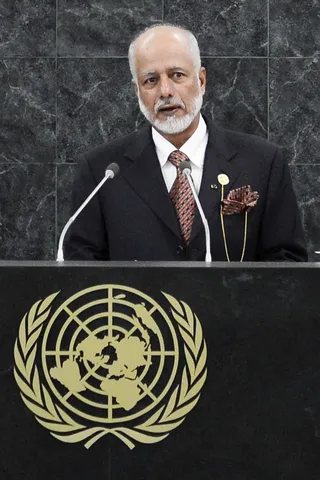Democratic Reforms in Gulf and Arab Nations
A look at the region's government reform.

1 / 16
The Arab Spring at a Glance - This weekend marked two U.S. Navy SEAL raids in Somalia and Libya in pursuit of two terror group leaders from al Qaeda and Al-Shabaab. The leaders were said to be responsible for two separate attacks in Kenya and South Africa. As both terror groups have gained more attention, since the Arab Spring erupted in December 2010, the Associated Press takes a look at democratic reform efforts in Arab and Gulf nations.--Dominique Zonyéé(Photos from left: AP, AP Photo/Mohamed Sheikh Nor, File)

2 / 16
Saudi Arabia - Saudi women were allowed this year for the first time in the Shura Council, an advisory body, and women will for the first time be allowed to vote and run in municipal elections planned for 2015. But the House of Saud runs the country.(Photo: REUTERS/Morteza Nikoubazl)

3 / 16
United Arab Emirates - The United Arab Emirates expanded the powers of its elected assembly, the Federal National Council, but it still has very limited authority and the candidates and electorate are hand-picked by the ruling families. (Photo: REUTERS/Ray Stubblebine)

4 / 16
Oman - Oman responded to the protests with some reforms such as elections for local councils that have no direct powers but will serve in an advisory role. But all key decisions still rest with Sultan Qaboos bin Said. (photo: REUTERS/Adrees Latif)
Photo By photo: REUTERS/Adrees Latif

5 / 16
Qatar - The former emir extended the term of the country's advisory panel, also known as the Shura Council. It's unclear how long the term would last, but the move is likely to delay elections for a more powerful legislative body proposed for later this year.(Photo: REUTERS/Amr Abdallah Dalsh)
ADVERTISEMENT

6 / 16
Kuwait - Kuwait has the most politically empowered parliament among the Gulf Arab states, but opposition groups want more concessions from the ruling Al Sabah family. Clashes erupted late last year before parliamentary elections that were boycotted by many opposition factions. (Photo: AP Photo/Gustavo Ferrari, File)

7 / 16
Yemen - The president was forced by protesters to step down, a new constitution is being drafted and elections are expected next year.(Photo: AP Photo/Muhammed Muheisen, File)

8 / 16
Bahrain - Bahrain is in the midst of Arab Spring-inspired unrest that has been simmering for several years but so far has failed to dislodge the ruling Al Khalifas (Photo: AP Photo/Ghiath Mohamad, File)

9 / 16
Jordan - New laws give the elected parliament stronger powers including a broader supervisory role over the Cabinet and picking the prime minister, but the king retains ultimate control. King Abdullah II has said he will gradually give the parliament more oversight over the state's daily affairs, but will "continue to serve as guarantor of the constitution" and "to play a role in vital strategic issues of foreign policy and national security."(Photo: REUTERS/Sergei Ilnitsky/Pool)

10 / 16
Egypt - President Mohammed Morsi and his Muslim Brotherhood emerged as the main winners in Egypt's first free parliamentary and presidential elections but were accused of trying to monopolize power. The military ousted Morsi in a popularly supported coup and installed a technocratic government. New elections are promised, but the timing is vague. (Photo: AP Photo/Hassan Ammar, File)
ADVERTISEMENT

11 / 16
Tunisia - Tunisia is struggling through a political transition after the ouster of its long-time dictator nearly three years ago. The country is suffering from economic woes and a sharp rise in extremism. Efforts to produce a new constitution have stalled and the assassinations of opposition politicians have thrown the process into chaos.(Photo: AP Photo/Christophe Ena, File)

12 / 16
Libya - Libya's post-Moammar Gadhafi government has been mired in political paralysis, fueled by rivalry between a Muslim Brotherhood-led bloc of Islamists and a liberal-leaning bloc following successful parliamentary elections last year. The sides have been unable to choose an assembly to write a new constitution and the central government has failed to rein in armed militias.(Photo: REUTERS/Andrew Winning)

13 / 16
Iraq - Iraq has had several democratic elections since the 2003 U.S.-led invasion that ousted Saddam Hussein, but they are overshadowed by sectarianism and tribalism that has led to a recent rise in violence. The political process is plagued by partisanship and political gridlock, and Prime Minister Nouri al-Maliki is accused by many of having authoritarian tendencies.(Photo: AP Photo/Hadi Mizban, File)

14 / 16
Morocco - Sporadic protests press for greater democratic reforms, but major demonstrations ended in 2011 after a new constitution was presented and early elections were won by an opposition party(Photo: Spencer Platt/Getty Images)

15 / 16
Algeria - Pro-reform protests have been limited by lavish spending of oil revenue on social and jobs programs, but Algeria's vast youth population appears increasingly disenchanted with the old guard leadership.(photo: REUTERS/Zohra Bensemra )
